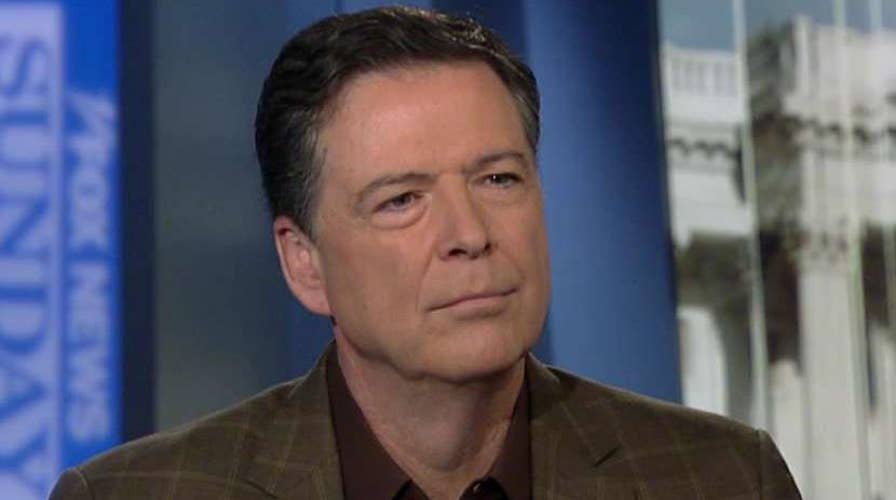James Comey on findings from DOJ inspector general's report on alleged FISA abuse
Former FBI Director James Comey joins Chris Wallace for an exclusive interview on 'Fox News Sunday.'
Former FBI Director James Comey admitted on "Fox News Sunday" that the recently released Justice Department Inspector General’s report on the launch of the FBI’s Russia investigation and their use of the surveillance process showed that he was "overconfident" when he defended his former agency's use of the Foreign Intelligence Surveillance Act (FISA).
This comes days after Inspector General Michael Horowitz’s report and testimony before the Senate Judiciary Committee detailed concerns that included 17 “significant errors and omissions” by the FBI’s investigative team when applying for a FISA warrant to monitor former Trump campaign adviser Carter Page. Horowitz referred “the entire chain of command” to the FBI and DOJ for “how to assess and address their performance failures” during the probe, which was conducted while Comey was in charge.
IG HOROWITZ RIPS FBI 'FAILURE IN RUSSIA PROBE, SAYS NOBODY VINDICATED BY REPORT
"He's right, I was wrong," Comey said about how the FBI used the FISA process, adding, "I was overconfident as director in our procedures," and that what happened "was not acceptable."
Horowitz did make it clear that he believes the FBI’s investigation of Russian election interference and possible connections with the Trump campaign was properly initiated, but he did note that this is based on a “low threshold.” He also concluded that there was no testimonial or documentary evidence to show that the investigation started due to any political bias, but said the issue of bias “gets murkier” when it comes to the various issues with the FISA process.
That process included the reliance on information gathered by former British spy Christopher Steele as part of opposition research conducted by Fusion GPS for the Democratic National Committee and Clinton campaign. Horowitz’s report stated that government attorneys were hesitant to approve a FISA warrant application until they relied on unverified information from Steele. That information also was used in subsequent renewals for the FISA warrant.
Comey downplayed the role of Steele's information in obtaining the FISA warrant against Page, claiming Sunday that it was "not a huge part of the presentation to the court," just part of the information included in the warrant application.
He insisted that he and Horowitz "weren't saying different things" about Steele's significance, but host Chris Wallace then read Horowitz's words, which said Steele's information "played a central and essential role" in establishing probable cause.
Comey said he did not "see the disconnect" between his stance and Horowitz's, even though he recognized that Steele's reporting "was the one that convinced the lawyers" to move forward.
When Wallace accused him of minimizing the relevance of Steele's information, Comey said, "if I was then I'm sorry that I did that."
Another tense exchange occurred when Comey and Wallace accused each other of "mischaracterizing" the problems with Steele's reporting. Comey claimed that the issue "were significant questions about the reliability of some of the sub-source reporting."
Wallace then pointed out that according to Horowitz's report, Steele's Russian sub-source was not the problem. Rather, the sub-source told the FBI that Steele was the one misrepresenting his statements, demonstrating a lack of reliability.
Comey maintained "that doesn't drive the conclusion that Steele's reporting was bunk."
In addition to the issues related to Steele, the FBI was found to have omitted exculpatory information about Page that could have impacted the judge’s decision in granting the FISA warrant. Included in this was an instance where an attorney was found to have altered an email to say that Page had not been a CIA source, when in fact he had been working with them. That information would have justified Page’s contacts with Russia, and its omission ultimately led to the FBI renewing the FISA warrant against Page.
In an April 2018 interview with MSNBC’s Rachel Maddow, Comey claimed that the FISA process is “incredibly rigorous” and claimed that Republicans’ criticism of the Page FISA warrant was “a political deal” that was not “based in substance or law.”
Following the report’s release, Comey essentially claimed vindication, declaring in the wake of the report that the criticism of the bureau's actions "was all lies.” When asked about vindication at a Senate Judiciary Committee hearing, the inspector general bluntly replied, "I think the activities we found here don’t vindicate anybody who touched this FISA."
Comey explained that his claim of vindication was not in reference to the issues identified in Horowtiz's report.
“What I mean is that the FBI was accused of treason, of illegal spying, of tapping Mr. Trump’s wires illegally, of opening an investigation without justification, of being a criminal conspiracy to unseat, defeat and then unseat a president. All of that was nonsense," he said.
On Sunday, Comey claimed that the FBI did not intentionally commit wrongdoing, but described the FBI's failures as "real sloppiness." He said the Horowitz report "did not find misconduct by any FBI people," rather just "mistakes and negligence."
Wallace was quick to remind Comey that attorney Kevin Clinesmith was referred for criminal investigation for the doctored email. Comey said "that's not been resolved." He did say it was "fair" to say that the FBI provided false information to the FISA court.
CLICK HERE TO GET THE FOX NEWS APP
Comey said that "in general" he was unaware of "the particulars of the investigation" when it was going on, but said that as the person at the head of the FBI at the time, it still falls on him.
"I was responsible for this."
Fox News’ Brooke Singman contributed to this report.






